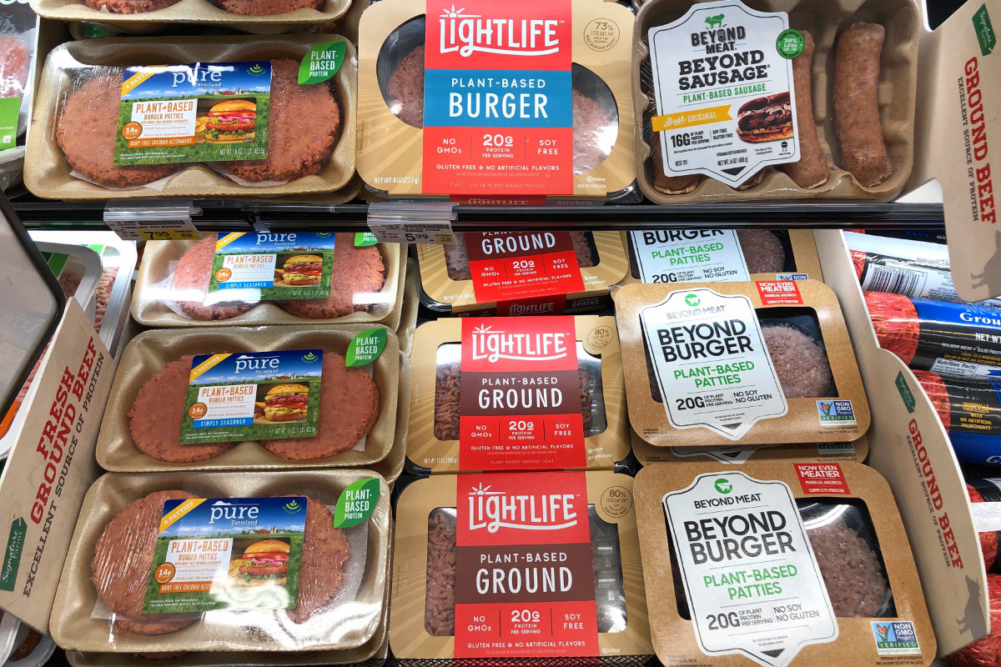To view the full Trends and Innovations Web Series presented by Food Business News, click here. Registration is free.
KANSAS CITY — Companies in the plant-based category should prepare for increased clean label scrutiny, both from consumers and competitors.
“We think you’re going to see a much bigger focus on clean label in this space in 2020, 2021 and beyond,” said Tom Vierhile, vice president of strategic insights for Innova Market Insights in the “Trends and Innovation Seminar,” a virtual event hosted by Food Business News on Aug. 26.
Focus will turn to the names on ingredient lists as well as the length of those lists.
“You are beginning to see a greater level of scrutiny when it comes to claims,” he said. “You are starting to see companies in the business start to criticize each other.”

Plant-based burger alternatives are an example. Mr. Vierhile pointed to a recent advertisement in The Wall Street Journal for the Lightlife brand that compared its plant-based burger alternative to the Beyond Burger and the Impossible Burger. While the Lightlife product has 11 ingredients, the Impossible Burger has 21, including bioengineered soy leghemoglobin, and the Beyond Burger has 18 ingredients. The ad said the other burgers had “hyper-processed” ingredients.
“What stood out to me is that Lightlife and Beyond Meat are not that dramatically different in ingredient profiles,” said Rachel Cheatham, PhD, founder and chief executive officer of Foodscape Group, LLC, a nutrition strategy consultancy based in Chicago, in the “Trends and Innovation Seminar.”
Both burger alternatives contain natural flavors. The Beyond Burger has methylcellulose in its ingredient list while the Lightlife burger has modified cellulose from plant fiber.
The Impossible Burger contains such ingredients as zinc gluconate, niacin, vitamin B1, vitamin B2, vitamin B6 and vitamin B12.
“A lot of the ingredients are actually vitamins and minerals, which you could argue are good for health,” Dr. Cheatham said. “You probably need some vitamin B12, especially for vegetarian and vegan (products), and yet that makes their ingredient list look longer.”
The clean label trend could sweep across the overall plant-based category.
“You also are going to see companies talk about simple formulation, simple ingredients, ingredients you know, ingredients you are going to find in your pantry,” Mr. Vierhile said. “These are all things that companies are going to stress as we go forward in the plant-based space.”
Carrageenan is under scrutiny, even though it is plant-based. Innova Market Insights, Arnhem, The Netherlands, has tracked hydrocolloids used in dairy alternative product launches. The percentage of launches containing carrageenan dropped to 13% in 2019, down from 21% in 2017 and 25% in 2015.
“Carrageenan is an ingredient derived from algae,” Mr. Vierhile said. “It is actually plant-based. Most consumers don’t understand that. When they see something like carrageenan on a product label, they question it.”
Overall, the plant-based category keeps growing. Three in five global consumers in a 2019 survey from Innova Market Insights said they are incorporating more plant ingredients in their diet. Global compound annual growth rates from 2015-19 were 8% for vegetarian claims, 22% for vegan claims and 57% for plant-based claims.
Mr. Vierhile called plant-based claims the “sweet spot.”
“This is really where a lot of the new product innovation is taking place,” he said. “A lot of bigger companies are also calling out the presence of plant-based ingredients right on the front of product packaging.”





